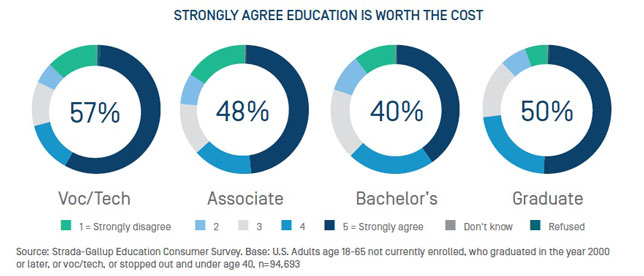Research
Americans Place Highest Value on Higher Ed Programs that Align with Career Pathways

Perception of education value, across degree types (Source: Strada-Gallup Edcation Consumer Survey)
According to a new report from nonprofit Strada Education Network, American adults most value higher education programs that are directly related to their career paths. "Changing the Value Equation for Higher Education" is based on the Strada-Gallup Education Consumer Survey, a poll of 340,000 adults across the United States on the value of their educational experiences beyond high school.
To measure that value, the report introduced the Strada Education Consumer Value Equation: a calculation of both "how strongly consumers believe their education was worth the cost" and whether they believe their education "makes them an attractive job candidate." (In contrast, other recent studies have focused on lifetime wages as a measure of educational value.)
"Educators, policymakers and advocates have spent the last decade debating ways to make education more valuable to students — but, until now, consumer voices have been largely missing from the conversation. With the Education Consumer Value Equation, we're equipping players throughout the educational ecosystem to take targeted action to address students' needs," explained Carol D'Amico, executive vice president, National Engagement and Mission at Strada Education Network, in a statement. "Consumers are telling us, loud and clear, that they want educational programs to connect directly with their career paths. It's time that we listen."
Other findings detailed in the report include:
- Graduates of vocational programs and graduate degree programs saw more value in their educational experiences than graduates of terminal bachelor's or associate degree programs;
- Respondents who stopped out of their programs before graduating were least likely to see value in their education experience;
- Among graduates with terminal bachelor's degrees, respondents saw greater value when their degrees were in career-associated majors such as healthcare and education, even if their salaries were lower than other fields; and
- Across the board for all majors and pathways, respondents who believed their coursework was relevant to their job perceived more value in their education.
"The data is telling policymakers, employers and educators alike that students in any major, from engineering to English to psychology, want to know how to connect their learning to a future job. We must work together to better help learners make those connections through advising, mentoring and applied learning," commented Sarah J. Bauder, chief transformation officer for the Pennsylvania State System of Higher Education. "As they consider investing their time, money and hopes in postsecondary education, consumers need to see that it will connect them with a purposeful pathway. That's when they find value."
The full report is available on the Strada Education Network site (registration required).
About the Author
Rhea Kelly is editor in chief for Campus Technology, THE Journal, and Spaces4Learning. She can be reached at [email protected].

